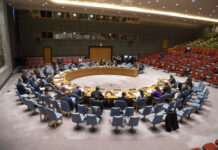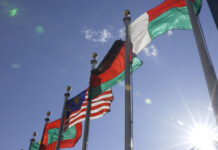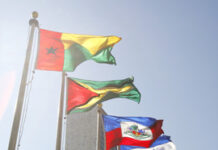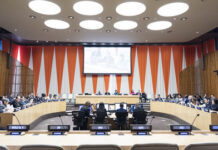Photo credit: DiasporaEngager (www.DiasporaEngager.com).
In recent years, few countries have reached the level of instability seen by Haiti. The collapse of its central government and authority structures have created an atmosphere of lawlessness, in which street-level violence has escalated. The constant threat of harm and kidnappings has disrupted everyday life for most Haitians, particularly around larger population centers. Many cannot continue with their daily routines due to the high risk.
This risk is felt even more heavily by Haiti’s parents, such as Apredieu, living in the watershed of Soliette, or Fabien in Bainet. On top of worrying about their personal safety, they are also concerned with the safety and wellbeing of their families. With limitations on how they can earn an income, they’ve had to work extra hard to develop self-sufficiency through sustainable agriculture in Haiti.
“My wife and I are traders. We have six children, and our trade used to allow us to take care of our children,” shares Apredieu. “Now, with the difficult situation that has been going on in Haiti, we are affected.”
Soliette is a little more calm, given its rural status. However, the violence in urban areas has affected their ability to bring their produce to market that could stifle their sustainable agriculture practice in Haiti.
“Even though the problems aren’t in the exact location where we live, my wife is unable to travel to Port-au-Prince to buy goods. There is a big risk, as bandits stop cars and steal all the goods they are able to find,” shares Apredieu.
“My wife and I have been very afraid of this. We even used to be able to go to the border
area, but we cannot do that anymore.”
In the absence of these options, they have resorted to opportunities closer to home, that cut back on their need to make the dangerous commute.
“Now, I have been going into a bakery to work so I can earn something that will help take care of my family. Still, things are getting harder everyday. We are able to persist, thanks to the Plant With Purpose activities in our community,” shares Apredieu.
Purpose Groups provide communities with self-operated financial services. This enables them to find the resources to start and promote their own business activities through savings and loans.
As Apredieu explains, “every person puts in the resources they are able to, and this creates an opportunity to borrow money and operate. This all happens within our community, in a climate of trust.”
That climate of trust cannot be overvalued, given the broader context. Purpose Groups also serve as Farmer Field Schools, where members can learn and exchange sustainable farming knowledge. Being able to grow more food in ones own home is also a layer of security during Haiti’s present challenges.
“As a farmer, I am interested in doing some experiments to grow new crops and to be able to produce more food and to get money in very small spaces and also where there is no topsoil,” shares Fabien. “I started growing my produce in a sack garden to overcome these challenges. I encourage other people to do the same in the aim to increase their food security.”
“This is what is creating hope for the future,” asserts Apredieu. “We have confidence, and we believe that no matter what the situation is, Plant With Purpose will be there and together we can find a way to keep living. That is what makes us glad this organization is here helping us develop sustainable agriculture in Haiti.”
Source of original article: Plant With Purpose (plantwithpurpose.org).
The content of this article does not necessarily reflect the views or opinion of Global Diaspora News (www.GlobalDiasporaNews.com).
To submit your press release: (https://www.GlobalDiasporaNews.com/pr).
To advertise on Global Diaspora News: (www.GlobalDiasporaNews.com/ads).
Sign up to Global Diaspora News newsletter (https://www.GlobalDiasporaNews.com/newsletter/) to start receiving updates and opportunities directly in your email inbox for free.
































